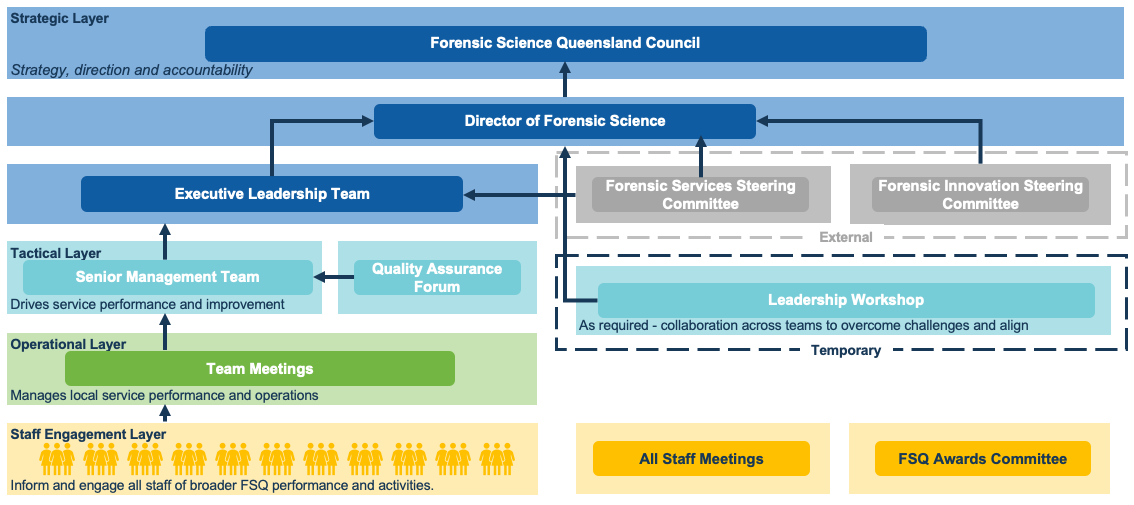Who we are
Located in Coopers Plains, Brisbane, Forensic Science Queensland (FSQ) is a pivotal institution supporting the criminal justice and coronial systems throughout Queensland. At FSQ, we are dedicated to upholding the highest standards of forensic analysis and expert advice, contributing significantly to the community and law enforcement efforts.
Our Expertise
FSQ comprises two primary divisions: Forensic Biology and Forensic Chemistry. Each division is equipped with state-of-the-art laboratories and staffed by skilled scientists who deliver critical services to the Queensland Police Service and other agencies.
- Forensic Chemistry: This division offers comprehensive analytical and advisory services in the areas of illicit drug analysis, clandestine drug laboratory investigations, and trace evidence examinations. Our work includes oil spill investigations, lubricant analysis, explosives, and fibres analysis, crucial in solving serious crimes including sexual assaults and murders.
- Forensic Biology: Specialising in evidence recovery, DNA analysis, and result interpretation, this division provides invaluable insights through meticulous examinations of exhibits, biological material screening, and sophisticated DNA profiling. Our experts also play a vital role in court, offering statistical interpretation and evidence.
How we were created
In June 2022, the Queensland Government established a Commission of Inquiry into Forensic DNA Testing, led by Mr Walter Sofronoff KC. By December 2022, the inquiry produced 123 recommendations for significant reforms in forensic services, which were fully accepted by the government. This led to the creation of Forensic Science Queensland and an investment of $170 million to improve and sustain forensic service delivery across the state.
Read more about the establishment of Forensic Science Queensland.
What do we value
Excellence
- Set ambitious goals for ourselves & our work
- Ensure accuracy, quality, reliability & precision in everything we do
- Embed a culture of continuous learning through personal & professional development
- Approach challenges with a creative, innovative & solution-oriented mindset
- Embed customer-centric thinking & actively seek feedback to drive improvement
Innovation
- Be open to change, new ideas & new ways of thinking
- Embrace co-design principles & cross-functional collaboration
- Learn from failures and see them as opportunities for growth
- Work collaboratively together & seek to integrate research & professional practice
- Empower & support each other to challenge the norm
Integrity
- Communicate respectfully, courageously & truthfully without judgement or assumption
- Ensure our actions align with organisational values & morals
- Be accountable, acknowledge errors & own any mistakes
- Safeguard sensitive & privileged information & respect confidentiality
- Make decisions through a lens of fairness, equity, quality & compliance
Collaboration
- Actively participate in activities to deliver team & organisational goals
- Share knowledge, expertise & resources to help everyone grow
- Seek diverse views & perspectives when designing solutions
- Share responsibility holding each other accountable for delivering assigned tasks
- Engage with stakeholders to understand their needs & deliver what matters
Respect
- Listen to others, show empathy & acknowledge different perspectives & feelings
- Actively promote an inclusive workplace where diverse opinions are respected
- Respect, value, champion, encourage & show appreciation for others contributions
- Provide and receive feedback in a timely, constructive & supportive manner
- Ensure all views & voices can be expressed & heard
How we make decisions
Our governance
A robust governance structure will enable the roles and responsibilities to collaborate with purpose and accountability
To establish effective governance across the forensic system, a clear, four-layer framework is recommended to provide a functional structure across strategic, tactical, operational and engagement activities.
- Strategic layer - Provides strategy, direction and accountability
- Tactical layer - Drives service performance and improvement
- Operational layer - Manages local service performance and operations
- Staff Engagement layer - Inform and engage all staff of broader FSQ performance and activities.

Our strategic plan
Read more about our strategic plan and how we plan to deliver high quality, timely and innovative forensic services.
Accreditation
Last updated: June 2024